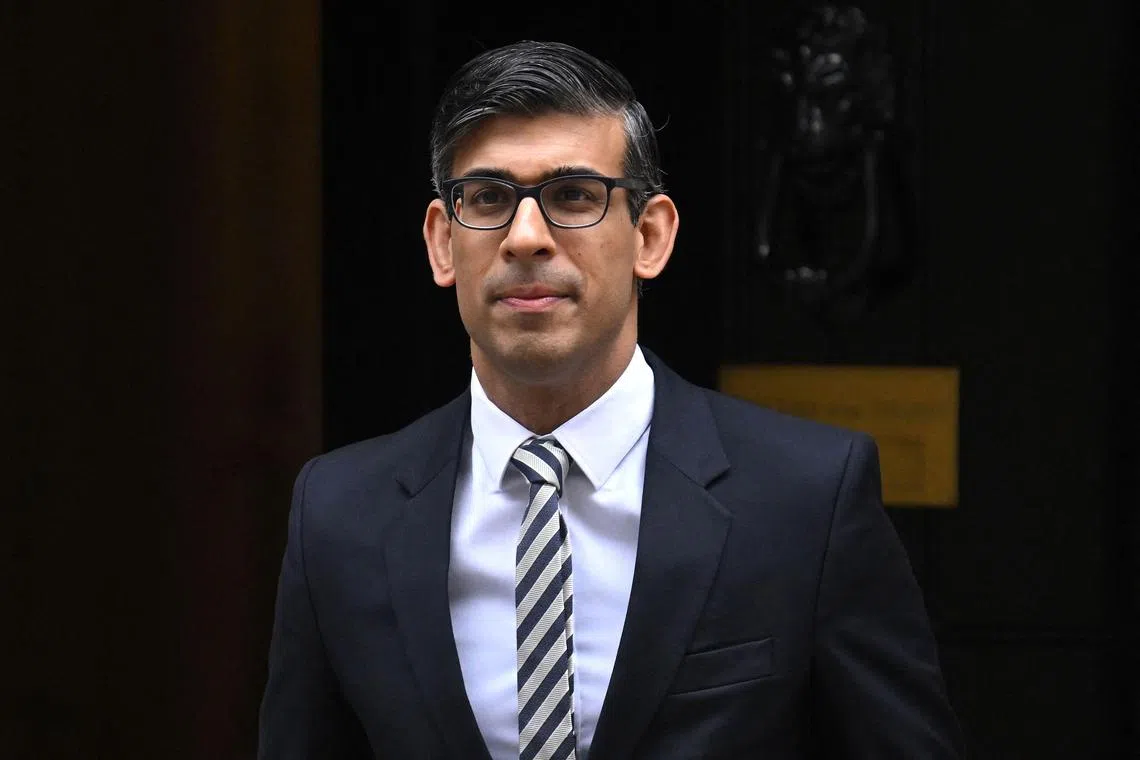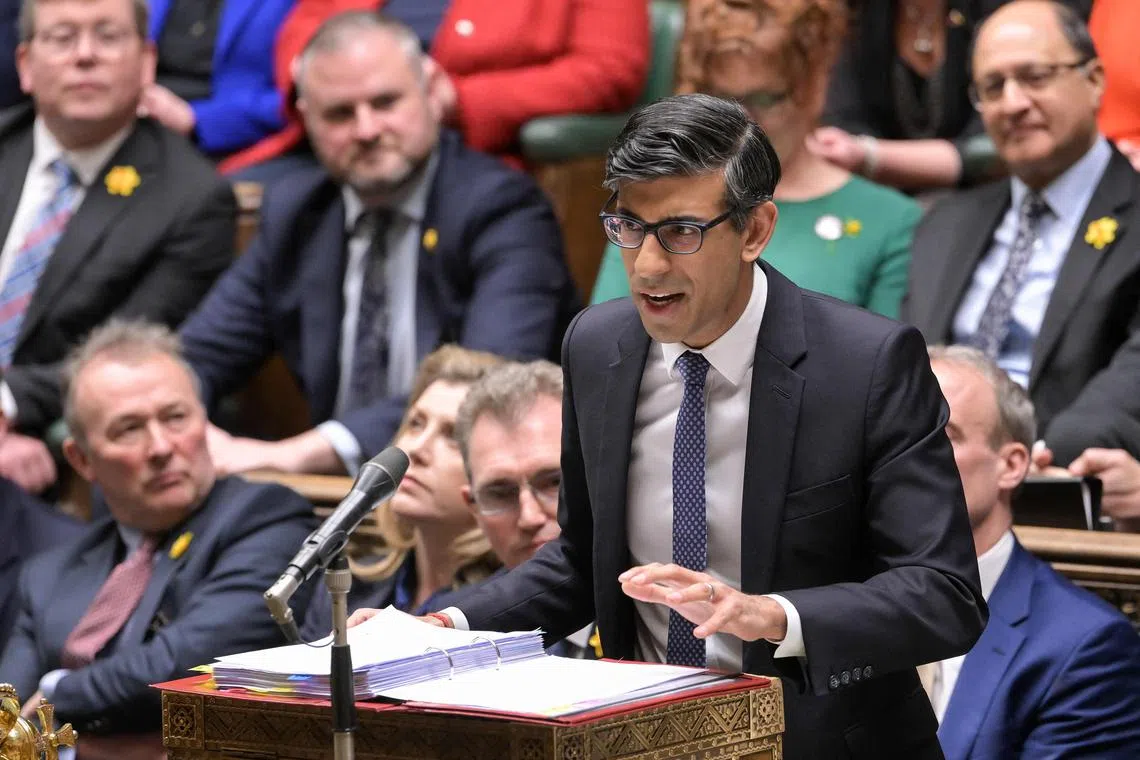Rishi Sunak’s next 6 months as PM look harder than the first
Sign up now: Get ST's newsletters delivered to your inbox

There are fears UK PM Rishi Sunak may hit a ceiling in upcoming polls as policy problems and political dramas pile up.
PHOTO: AFP
LONDON – UK Prime Minister Rishi Sunak had two tasks when he entered Downing Street:
Tory strategists worry he’s now in danger of getting stuck between Job 1 and Job 2.
Mr Sunak has successfully eaten into the opposition poll lead – Mr Keir Starmer’s Labour Party was about 27 points ahead when Mr Sunak took power in October, and now leads by about 15 points.
But a real-life electoral test looms next week, with thousands of local council seats up for grabs in votes across England. And there are big challenges coming down the track.
Tory ministers, strategists and advisers fear that Mr Sunak risks losing momentum, hitting a ceiling in the polls as policy problems and political dramas pile up.
These include concerns that Mr Sunak may find it harder than expected to meet five key pledges he made to voters at the start of 2023, the people said, speaking on condition of anonymity when discussing their private views.
Polls show that Mr Sunak has won back a group of voters that typically favour the Conservatives but lost faith in the party during the turmoil of the Truss and Boris Johnson governments, according to people briefed on internal party strategy and polling.
The Prime Minister’s team put that down to Mr Sunak’s early success at projecting an air of relative competence.
Regaining the trust of even those voters was by no means guaranteed, but a significant part of the huge Labour lead in the initial post-Truss period was always going to be soft, one strategist said.
Polls are always likely to narrow as an election approaches, Tory and Labour advisers agree.
Now Mr Sunak needs to win over voters who don’t have historic affinity for the Tories.
Conservative aides admit that if the party does not claw enough of them back, Mr Sunak will still be on course for a resounding electoral defeat.
To take the next step, he may well need to come up with a more meaningful offer to the public, senior Conservatives told Bloomberg.
Party headquarters has warned Downing Street that Labour’s lead could become harder to break down.
One aide compared it to eating an ice cream with a soft, creamy exterior only to encounter a hard chocolate core at the centre.
The key question was always how Mr Sunak’s team can reduce the deficit to between five and 10 points before the election campaign begins, a Cabinet minister said.
Tory strategists see that as the kind of Labour poll lead that allows them to argue that the country is heading for a hung Parliament, with no one party securing a governing majority.
The 2010 election produced a hung Parliament and a Conservative-Liberal Democrat coalition government; the 2015 election delivered a Conservative majority after Tory attack ads over the prospect of the Scottish National Party propping up Labour.

UK PM Rishi Sunak may find it harder than expected to meet five key pledges he made to voters at the start of 2023
PHOTO: AFP
Mr Sunak’s strategists want to deploy that well-rehearsed line once again.
But Mr Sunak is battling a powerful Labour narrative: That after 13 years of Conservative mismanagement, it’s time for change.
Some Sunak allies are increasingly nervous that the tests he set himself – to halve inflation, get debt falling, the economy growing, health service waiting lists down and migrant crossings stopped – are proving trickier than many thought.
When they were announced in January, many dismissed them as deliberately easy to achieve. That no longer looks the case, one Sunak-backer joked.
Government officials were furious with remarks this week by Bank of England chief economist Huw Pill that Britons have to accept they are worse off as they gear up for an election year.
Inflation is still forecast to halve from around 10 per cent by the end of the year.
But it is proving stickier than expected and is on track to end up around 4-5 per cent, rather than the 2-3 per cent some of Mr Sunak’s team privately hoped for.
It also means Chancellor of the Exchequer Jeremy Hunt will find it harder to bring forward tax cuts or settle industrial disputes with unions with more generous pay offers. The prospect of strikes continuing would be a major threat to the Sunak-as-problem-solver image.
There won’t be much to shout about on economic growth by the end of the year, either. The International Monetary Fund expects Britain to be one of the worst performing major economies this year, with anaemic growth in 2024.
Yet the current No. 10 plan, previously reported by Bloomberg, is for Mr Hunt to offer tax cuts at the two fiscal statements likely before an election in a bid to boost poll ratings.
March was a good month, the Cabinet minister said, with wins on migration, the Budget and the Aukus defence pact.
April, though, saw Conservative fortunes head downhill: Deputy Prime Minister Dominic Raab resigned over bullying claims and health, rail and school workers threatened new strike action.
May and June don’t look much easier, with improving weather meaning more migrants may cross the English Channel in small boats.
Nonetheless, one senior Conservative election strategist is optimistic, partly because they don’t see positive sentiment among voters towards Mr Starmer. Voters are not convinced that the Labour leader can show he is sufficiently different from Mr Sunak to offer a real alternative, they said.
Labour “benefits from fundamentals but suffers from the charge that Starmer has no positive offer”, argued Mr Luke Tryl, director of the More in Common think tank.
Even so, Mr Sunak seems unable for now to make further inroads into Labour’s poll lead.
The Conservative focus on his competent delivery “has reaped results and got wavering – but normally loyal – Tories back”, Mr Tryl said. “They now need things to materially improve and for people to feel it.” BLOOMBERG


